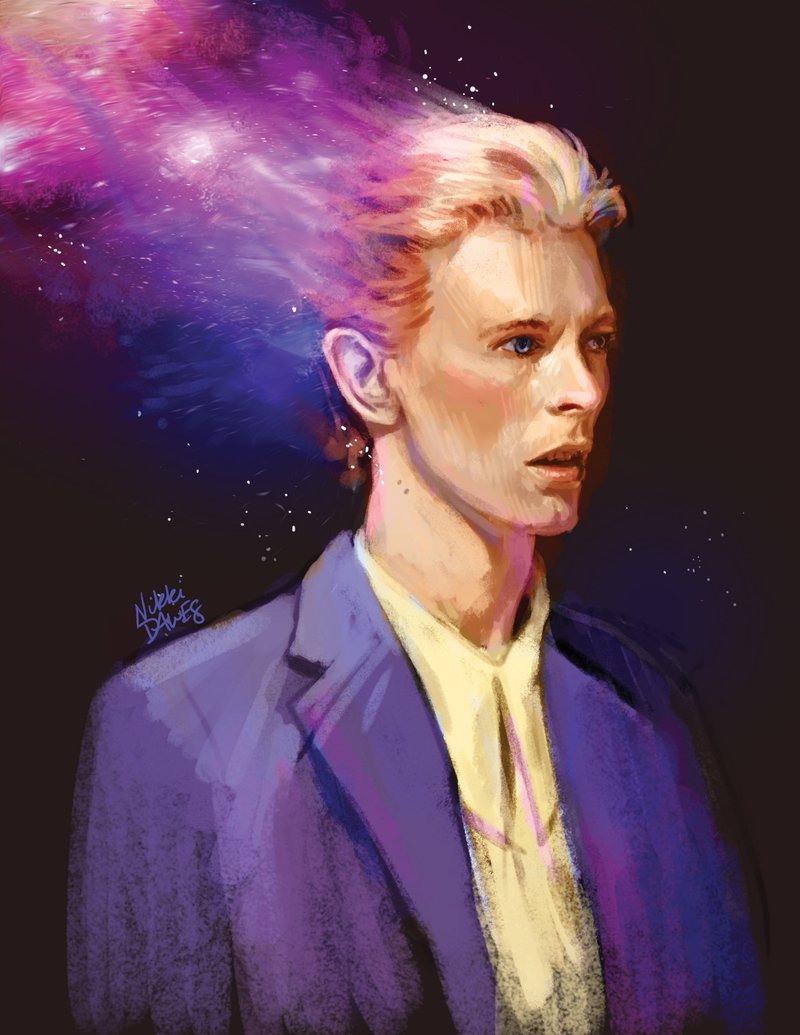"Planet Earth is blue, and there's nothing I can do ..."
-- David Bowie,
"Space Oddity"
It wasn't cool to like David Bowie in my high school. When we drove around at night, worrying through the boom-bust oilfield graveyards and the piney woods, Bad Company and Zeppelin, the Rolling Stones and Jethro Tull bumped out of the Craig Powerplay. We listened to Lynyrd Skynyrd and the Marshall Tucker Band. We listened to REO Speedwagon's Riding the Storm Out and early Journey, before Steve Perry joined the band. We listened to Hall & Oates' Abandoned Luncheonette so often that John Oates' vocal parts -- what I sang when my friend Billy took on Daryl Hall -- are imprinted in my brain.
It wasn't cool to like David Bowie. So I kept it to myself.
I thought it was like this everywhere, that the shape-shifting Bowie was a minority taste, something you heard on the radio sometimes. He might have been big up North or back East, but all we knew were "Ch-ch-changes" and "Ziggy Stardust." When kids in my circles talked of him, they generally dismissed him with a rude word.
There's a scene in Saturday Night Fever that perfectly reflects how Bowie was received by my crowd. Stephanie Mangano (Karen Lynn Gorney), the hotshot dancer whom Tony Manero (John Travolta) teams up with, is hanging out with Tony's crew in a White Castle, obviously trying to impress them with her sophistication and her job in the office of a press agent.
"You know who came in today?" she bubbles, "This guy, David Bowie. He comes in, has this astrakhan coat ..."
This elicits a slur from Double J. (Paul Pape).
"You mean he's a bisexual," Stephanie patiently explains.
"Yeah, he swings both ways," Double J. replies. "Men and boys."
I laughed like a donkey at the line when I heard it in 1977, though I related to Stephanie more than Double J. or even Tony. Even then I realized Bowie and his astrakhan coat symbolized a mode of living that I could aspire to, something beyond the relatively circumscribed expectations of one's parents. Stephanie was uncouth and pretentious, but she meant to achieve escape velocity. Bowie was a thrilling possibility for her, and for me too.
It had nothing to do with his sexuality, though I wonder how I might have responded to him had I been keeping secrets.
Born David Jones in Brixton, England (he changed his name to avoid confusion with Monkee Davy Jones), Bowie was always as famous for his image as for his music, and in his case the attention was justified. Bowie wasn't the first rock star to experiment with impersonation and self-reinvention. Elvis had gotten there before him, dying his dirty blond hair jet black because he thought black-haired movie stars enjoyed longer careers. Then Dylan came wandering out of the Iron Range, with an Okie accent and misplaced parents. But Bowie made fluidity of identity his thing; he was never anything for long and he murdered his darlings viciously. His media manipulation in the early '70s so encouraged confusion between the artist and the stage persona that some took the destruction of Ziggy Stardust as the end of Bowie.
I didn't really catch on to him until 1972, when, in the wake of the success of the Ziggy Stardust album, RCA rereleased his 1969 album, originally titled Man of Words/Man of Music (it was just called David Bowie in the U.K.), as Space Oddity, after the title track. While "Space Oddity" the single had reached No. 5 in the U.K. charts, it hadn't made much of an impression when it was released in the U.S., reaching only No. 124 on the charts.
I remember being confused by the rerelease, it felt like a time slip to me. I had vague memories of the song -- there was a sixth-grade classmate who insisted that Leonard Nimoy, Star Trek's Mr. Spock, sang it. I didn't understand how they could release the song again -- I felt there should be some kind of rule against it. It all seemed oddly disconcerting and it wasn't until I was an adult that I sorted out the chronology. For years I thought Hunky Dory was the first Bowie album, followed by The Man Who Sold the World, followed by The Rise of Ziggy Stardust and the Spiders from Mars. (And it doesn't help that there's yet another David Bowie album -- a collection of early cuts -- floating around out there.)
When I discovered the David Bowie album while flipping through the rather small file of product available at the Barksdale Air Force Base BX, I bought it in part because it felt like a mythic artifact. "Space Oddity," at that time, felt like a song I'd dreamed.
It wasn't a good album, though my critical faculty wasn't developed to the point where I thought about albums as anything other than collections of songs. "Space Oddity" appealed to me, but most of the rest I sloughed off as folky and slight. But it was enough to start me in -- soon I'd acquired Ziggy Stardust, and after that Hunky Dory. I bought Young Americans the day it was released in 1975.
That was a breakthrough for me. Some of my friends received Young Americans -- without prejudice, it should be noted, for they wore leisure suits and platform shoes -- as a "disco album." For me, it -- along with Elton John's similar experiments with Philadelphia soul (see the 1979 release The Thom Bell Sessions) -- provided a gateway drug into black soul music. Willie Weeks and Carlos Alomar's slinky bass lines and David Sanborn's aching alto sax busted up my idea of rock 'n' roll as something played by long-haired white guys with guitars. It got to me on a visceral level and opened me up to Marvin Gaye and James Brown (who borrowed -- or maybe borrowed back -- the bass line from "Fame").
Bowie knew what he was doing. He had tired of the apocalyptic theater he'd indulged in with Ziggy and Aladdin Sane, so he'd disguised himself as a blue-eyed soul singer, a songster. He delivered the best review of the album himself, when he told Cameron Crowe, on assignment for Playboy: "It's the squashed remains of ethnic music as it survives in the age of Muzak rock, written and sung by a white limey."
And then he moved off to Berlin and, with collaborators Brian Eno and Tony Visconti, created some of the most influential pop music of the 20th century -- the remarkable Berlin trilogy: Low, Heroes (both 1977) and Lodger (1979) -- industrial soundscapes that presaged Nine Inch Nails and others.
When I was in college, it became cool to like those records, and maybe that's why I didn't listen to them as hard as I should have. I cooled on Bowie for a while and remember that when I saw him on his Serious Moonlight tour in 1983 I was impressed with the show but considered it largely an exercise in nostalgia. But I came back to him in the '90s, and held fast. His 21st-century albums, Heathen (2002), Reality (2003) and The Next Day (2013), were serious works of art, deep and searching, curious about the human condition and interested in the ways that sound and vision can shape a world.
I think David Bowie pushed the world ahead a little bit, that if it weren't for him we might be even less tolerant of those who don't strike us as ordinary. I think he was a humanizing force, an artist who fell to Earth to show us how to be more engaged with the possibilities of life on our sad little planet. Just last month my wife and I were talking about his duet with Bing Crosby, their endearingly strange performance of "Peace on Earth/The Little Drummer Boy" on Bing Crosby's Merrie Olde Christmas.
It is difficult for me to imagine Bowie -- in 1977, at the height of the punk backlash against rock stars -- being asked, much less agreeing, to perform on a hokey network television Christmas special. If the clip didn't exist on YouTube, I might suspect I had dreamed it.
No doubt Bowie was motivated to do it because he understood how surreal it all was, but his appearance was also indicative of a certain generosity, his willingness to embrace an audience that didn't know Ziggy. He didn't mind appealing to grandmothers or children.
Last week a link to a stream of Blackstar, the album released Jan. 8, two days before his death, appeared in my inbox. I didn't open it. I don't like to bother with streams -- I find them inconvenient. I felt there would be plenty of time.
Now I feel bad about that -- I've only heard a little of Blackstar, what my friends are posting on their Facebook timelines. I know it will be waiting for me later, to get to in my own time, just as Ziggy Stardust and Halloween Jack are out there waiting for whomever to discover them in their own time.
When you are ready, your Bowie will arrive.
Email:
pmartin@arkansasonline.com
Style on 01/17/2016

